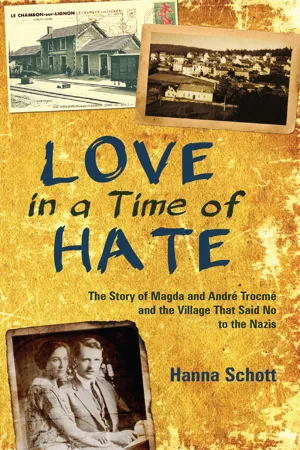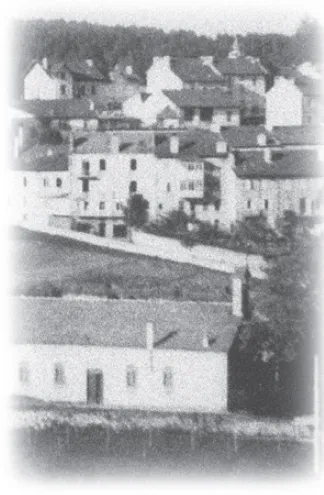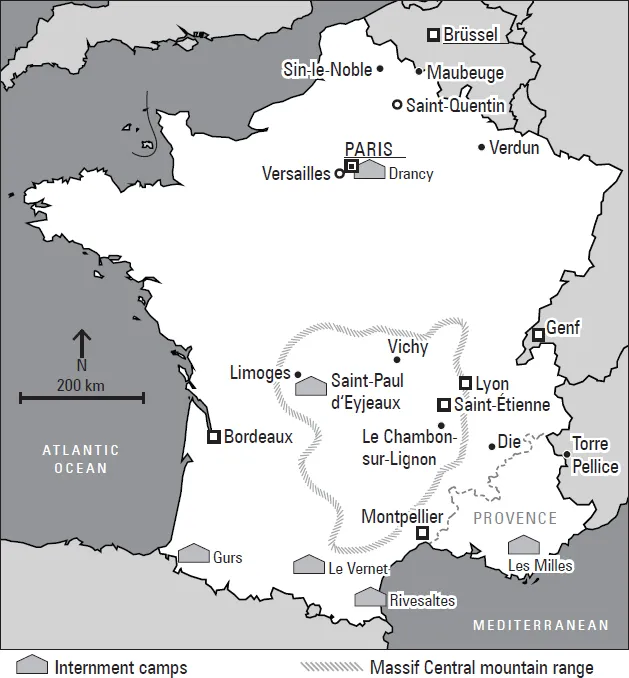![]()
PART IV
![]()
13
Moving to the End of the Earth
Sin-le-Noble, 1933–Le Chambon-sur-Lignon, 1934
There are no states or provinces in France. This means that virtually everything of importance—not only in politics but also in all matters related to school, culture, and church—is decided in Paris and orchestrated from Paris. This is very practical if you are moving your child from one school to another. But for a teacher, it means that you can be transferred to a new position anywhere in the entire country. Naturally, this is not always good news.
The Reformed Church of France, André’s employer, operated in the same way. The Trocmés urgently wanted to leave northern France. From the time she was a baby, Nelly, the oldest child, had suffered from severe bronchitis, forcing her to spend periods of time in a pediatric hospital in Switzerland. The three boys were also sick almost constantly. Nearly every family in the congregation had at least one person suffering from tuberculosis; the first antibiotic treatments would not be available worldwide for another ten years. In addition, a second sickness raged that is nearly forgotten today: silicosis, also known as black lung disease. The illness, normally contracted only by those who had spent many days working underground, was triggered by breathing fine dust that contained quartz. In Sin-le-Noble, however, the air was so contaminated with mineral dust that the sickness could affect anyone, including children.
André heard that a pastoral position was about to become available in a working-class suburb south of Paris. He sent a written application, was invited to give a trial sermon, and interviewed with the church council. Everything was proceeding exactly according to church protocol, and both sides seemed to be very excited. André was open about his commitment to pacifism, but he promised not to use the pulpit to advocate for his position or to push it upon others. The church council was taken with the young, committed pastor and gave him a written intent to hire.
Everything was arranged, and the family began to make plans for the move. But suddenly the church administration in Paris intervened. A pacifist? So close to Paris? This would surely threaten the peace within church circles. The congregation would have to find a different pastor.
Incensed, André traveled to Paris and demanded a conversation with the church president.
“I did not summon you!” the president shouted angrily.
“I know,” André responded, looking at him intently. “But I’m going to stay here until you hear me out.”
For fifteen minutes André waited in the hallway. Then he was called into the conference room. Fifteen men had gathered there. André stood in front of them—no one invited him to take a seat. The men were obviously not intending for a small-town pastor with grand visions for transforming the world to steal their time.
“My dear Mr. Trocmé,” said the church president. “I’m going to ask you only one question. Let’s assume there is a war: Will you put on a uniform and defend the fatherland? Yes or no?” The president did not wait for an answer. “I know that you conscientious objectors have your pride. You don’t want to get your hands dirty, so you prefer to turn to other people when it comes time to resist evil. We cannot give you the pastoral position that you have applied for. You may go.”
Blindsided, André turned red and started for the door. But then the outrage that rose inside him found expression in a single sentence: “Gentlemen, it seems to me that in light of such a momentous decision it would be most appropriate for us to have a prayer together.”
Fourteen mouths hung open; fourteen pairs of eyes glanced nervously around the room. Only the president kept his composure. “Brother Gounelle, would you please be so good as to offer a prayer.”
Pastor Gounelle was the oldest person in the room. He prayed with a quavering voice, “Lord, bless your church and lead this young, misguided pastor back to the right path.”
Several minutes later, the “young, misguided pastor” stood again outside the room. The veto of the church administration remained unshaken.
“No one said ‘hello’ or ‘goodbye’ to me,” he wrote twenty years later. “I stood on the street in front of the door of the Reformed Church of France and could not have imagined that a second world war and the scandal of a collaboration with a victorious enemy would be necessary in order to plant a doubt in the hearts of these good patriots of 1914 that France was always right and would always remain right. How could a Christian doubt this or refuse to bear arms when the cause of France was always God’s cause?”
***
So the search for a new position resumed. What other place could be suitable for a family with four small, sickly children?
Soon after the trip to Paris, another perfect solution seemed to present itself. On the southern coast of Lake Geneva, at the foot of Mont Blanc looking out toward Lausanne and the Swiss mountains, was the village of Thonon-les-Bains. A Protestant pastor was needed in this lovely Alpine countryside! André traveled there and introduced himself. Once again, he and the church council quickly reached an understanding. He was as good as selected.
But one woman on the council was absent. She was on her way to Paris, to the church offices. Then things took an inevitable turn. This plan too came to naught on the question of pacifism.
Was it a mistake to leave the work in Sin-le-Noble? Was it perhaps even “unspiritual”—a kind of escape? Magda and André began to doubt whether they were doing the right thing in their search for a new congregation. So they sought counsel from older, experienced acquaintances.
“You have made a commitment to give your lives in service to the church here in the north. If you leave, it would be an act of disobedience against God,” said one assertive church leader.
“Since God has permitted your children to be sick, he is trying to tell you something: he wants you to move to another place,” said two elderly women.
Considering the elderly women to be wiser, Magda and André followed their counsel and continued to look for another position. And, in the end, they found it, even though it was anything but an ideal congregation in an ideal location.
***
André’s pacifist convictions, which had been the source of so many difficulties in France, led him to look outside the country to Germany, considered by many to be the archenemy. Since the time of his childhood, when he visited his relatives in Lippe, Germany, André had been in the homeland of his mother on only one other occasion. In the summer of 1927, he had participated in a conference of the International Fellowship of Reconciliation. Peace activists from nineteen countries had come together to express their opposition to the prevailing militarism and to advocate for the recognition of conscientious objection.
Now, five years later, he traveled again to Germany, this time for a peace march that began in France and was scheduled to pass through southern Germany. André was uneasy about the trip. Could he leave Magda and the four children alone in the summer house of the extended Trocmé family? But it was Magda who encouraged him: “Go ahead! You sometimes confuse duty with tradition. It’s important that you leave behind a strong impression. The congregation is not going to collapse if you are gone for two weeks. And we aren’t going to either.”
The host and organizer of the gathering was the German Peace Federation, a coalition of groups with socialist tendencies. The federation had advertised the peace conference widely, and it filled halls in Frankfurt, Offenbach, and Heidelberg without any difficulty. In Offenbach, a pastor by the name of Goethe led the event. Shortly before the meeting, his home was trashed by young Nazis. The police openly colluded with the vandals, arriving at the scene only after the perpetrators had left.
In Heidelberg, André himself was attacked. “You want to lather [dupe] us so that France and England can shave us closer!” yelled a group of Brownshirts as one of them waved a revolver in André’s face.1 “Go ahead,” André shouted. “Kill me here in front of all these people.” And that was what calmed the man. Only later did André discover that the young man had already murdered four Jews.
When participants in the peace march arrived in Reutlingen, the local coordinator greeted them with bad news. “The theater is already completely filled. But it’s all Brownshirts. They have sworn not to allow you to speak. Unfortunately, we need to cancel the event.”
At André’s initiative, the group retreated for a prayer. Then they decided to go into the theater and at least try to speak to the Nazis. André, the foreigner who spoke the best German, was asked to speak to the crowd. The peace activists entered the theater through the stage entrance and stood quietly behind the curtain. On the other side they could hear the noise of the mob.
“The lectern is there in the front,” counseled a person knowledgeable of the theater. “Go right to it and begin to speak immediately. Otherwise, you’ll be shouted down before you’re able to say a word.”
André did exactly that. Scarcely had he reached the lectern when he greeted the crowd of four or five hundred people with the words “Germany, awaken!”
Quiet. A stunned silence.
“I mean exactly what I said,” André continued. “Germany must awaken since we are now threatened once more with a world war. I’m French, and our people suffered the most during the last war. But now it’s time to forgive each other and to be reconciled. Whoever here today is a Christian is against war and everything that promotes preparation for war. Christians will refuse military service.”
Thunderous applause. Was he dreaming? Or were these Nazis really applauding a pacifist?
In any case, the following speakers were able to present what they had prepared without interruption.
“You said exactly the same thing that our führer said!” the commander of the Reutlinger Sturmabteilung said to André after the event. “Justice and equality for everyone! Peace!”
“Yes, but Hitler says it a little bit differently,” André said. “And why does he persecute the Jews?”
“Jews are the biggest enemy of peace,” the young commander said. He could not be dissuaded from this conviction.
“I have often thought back on that scene in Reutlingen,” wrote André years later. “Hitler succeeded in inspiring guileless young people for his malicious intentions. To the irreligious, critical, and sharp-witted French, the naiveté of the Germans—their simple-minded tendencies in both good and evil, their impulse to muddle together all values—was always incomprehensible.”
A few months later, Adolf Hitler came to power. But he did not exactly “seize” power, as some describe it. Rather, he was promoted from president to chancellor in a completely legal, democratic manner. He received overwhelming support from enthusiastic masses who were, and who wished to remain, unaware.
***
André was back in France and still looking for a new position. When he finally heard of a place where people supposedly wanted him as a pastor, and where it was guaranteed that there would be no problems with the church administration, he and Magda had to search long and hard for it on the map.
French maps identified fourteen different places bearing the name Chambon—the word comes from the Latin campus, or field—and apparently there were fields everywhere. To distinguish the various Chambons from each other, many of them had an additional name as well. So Magda and André searched for Le Chambon-sur-Lignon. But, confusingly, some maps marked the same place as Chambon-de-Tence. They finally found the Lignon, a tributary of the Loire River in the Massif Central not far from Ardèche, which helped them locate the correct Chambon. Unfortunately, it appeared to be quite far from any other attractive destinations. What a remote region! Not quite part of the Cévennes mountain range, but also not part of Provence; not in western France nor quite in eastern France, and difficult to reach from the Rhône valley because it was a thousand meters (about three thousand feet) above the river. André could already imagine the handful of Protestant farmers who probably lived there. The region was known as the plateau Vivarais-Lignon. Not exactly memorable (later they would become accustomed to simply saying “the plateau” as everyone else did). In fact, there was only one recognizable name on the map: the Loire River, whose source must have been located somewhere in the mountains not far from Le Chambon.
“I had promised myself,” André wrote, “never to become a village pastor. It was the cities and their problems that fascinated me.” But what could he do? Stay in Sin-le-Noble for the foreseeable future and consign his children to an unhealthy climate? His reputation among church administrators was evidently so bad that he really could not expect anything better than a village like Le Chambon. It was only a question of yes or no. André thought about his children: Nelly, Jean-Pierre, Jacques, and Daniel. With a sigh, he said yes.
But even here a trick was needed so that André could be hired without once again having the rug pulled out from beneath him. René, a friend from his student days, was now president of the church district and wanted to help his old friend. It was his idea that André should serve in Le Chambon as the interim pastor for a transition period of one year. No one was going to go to the work of standing in the way of that arrangement. And then, after a year had gone by, they could see where things stood.
André agreed to the strategy. He had only one request in the matter: the parsonage at Le Chambon needed to be equipped with central heating. Their home would be nearly a thousand meters (about three thousand feet) above sea level, and he and Magda did not want to begin their day for nine months of the year by trying to start a fire in the kitchen and the workroom.
In September 1934, after a journey of eight hundred kilometers (five hundred miles), the Trocmé family arrived at their new home. They took one look and turned away. The heating had not yet been installed, and it was already cold. The parsonage, a ramshackle castle built out of coarse granite on a slope overlooking the Lignon, was a construction site. So the Trocmés moved into an apartment for an expensive wait that stretched their finances to the breaking point.
At least Le Chambon, with its nearly one thousand inhabitants, had hotels and apartments for rent—in great quantity. Located at the north edge of the plateau was Saint-Étienne, a center of metal production known especially for its weapons and tools. But coal was also in great supply in Saint-Étienne. Since the end of the nineteenth century, Le Chambon had become a kind of health resort for the miners, and even more so for their children. A single-track railroad extended into the plateau—a tiny spur line that brought workers’ children up the mountain to seek respite for their health. Before they were parceled out to the hotels, apartments, and convalescent homes, the children were requ...


